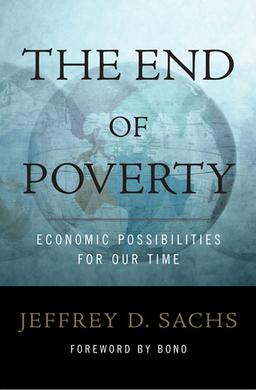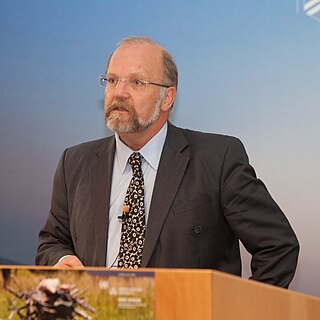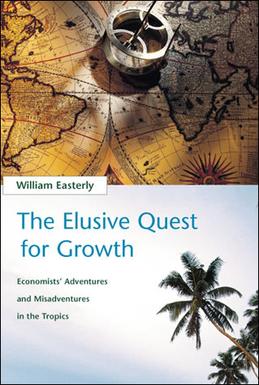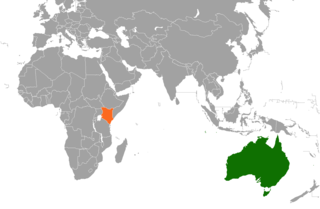Import substitution industrialization (ISI) is a trade and economic policy that advocates replacing foreign imports with domestic production. It is based on the premise that a country should attempt to reduce its foreign dependency through the local production of industrialized products. The term primarily refers to 20th-century development economics policies, but it has been advocated since the 18th century by economists such as Friedrich List and Alexander Hamilton.

Development economics is a branch of economics that deals with economic aspects of the development process in low- and middle- income countries. Its focus is not only on methods of promoting economic development, economic growth and structural change but also on improving the potential for the mass of the population, for example, through health, education and workplace conditions, whether through public or private channels.

Jeffrey David Sachs is an American economist and public policy analyst who is a professor at Columbia University, where he was former director of The Earth Institute. He worked on the topics of sustainable development and economic development.
Dependency theory is the idea that resources flow from a "periphery" of poor and exploited states to a "core" of wealthy states, enriching the latter at the expense of the former. A central contention of dependency theory is that poor states are impoverished and rich ones enriched by the way poor states are integrated into the "world system". This theory was officially developed in the late 1960s following World War II, as scholars searched for the root issue in the lack of development in Latin America.

Jagdish Natwarlal Bhagwati is an Indian-born naturalized American economist and one of the most influential trade theorists of his generation. He is a University Professor of economics and law at Columbia University and a Senior Fellow in International Economics at the Council on Foreign Relations. He has made significant contributions to international trade theory and economic development.

The economy of Africa consists of the trade, industry, agriculture, and human resources of the continent. As of 2019, approximately 1.3 billion people were living in 53 countries in Africa. Africa is a resource-rich continent. Recent growth has been due to growth in sales, commodities, services, and manufacturing. West Africa, East Africa, Central Africa and Southern Africa in particular, are expected to reach a combined GDP of $29 trillion by 2050.
Aid effectiveness is the degree of success or failure of international aid. Concern with aid effectiveness might be at a high level of generality, or it might be more detailed.

In international relations, aid is – from the perspective of governments – a voluntary transfer of resources from one country to another. The type of aid given may be classified according to various factors, including its intended purpose, the terms or conditions under which it is given, its source, and its level of urgency. For example, aid may be classified based on urgency into emergency aid and development aid.

Development geography is a branch of geography which refers to the standard of living and its quality of life of its human inhabitants. In this context, development is a process of change that affects peoples' lives. It may involve an improvement in the quality of life as perceived by the people undergoing change. However, development is not always a positive process. Gunder Frank commented on the global economic forces that lead to the development of underdevelopment. This is covered in his dependency theory.
The Inter Region Economic Network (IREN) is a private Limited company based in Nairobi, Kenya, which advocates for free market economics for the development of Africa. Its founder and director is James Shikwati. IREN's key focus areas include targeted events, training, research, consultancy, communication and its online flagship magazine: The African Executive - published in English every Wednesday.

Poverty reduction, poverty relief, or poverty alleviation is a set of measures, both economic and humanitarian, that are intended to permanently lift people out of poverty. Measures, like those promoted by Henry George in his economics classic Progress and Poverty, are those that raise, or are intended to raise, ways of enabling the poor to create wealth for themselves as a conduit of ending poverty forever. In modern times, various economists within the Georgism movement propose measures like the land value tax to enhance access to the natural world for all. Poverty occurs in both developing countries and developed countries. While poverty is much more widespread in developing countries, both types of countries undertake poverty reduction measures.

Andrew Mwenda is a Ugandan print, radio and television journalist, and the founder and owner of The Independent, a current affairs newsmagazine. He was previously the political editor of The Daily Monitor, a Ugandan tabloid, and was the presenter of Andrew Mwenda Live on KFM Radio in Kampala, Uganda's capital city.

William Russell Easterly is an American economist specializing in economic development. He is a professor of economics at New York University, joint with Africa House, and co-director of NYU’s Development Research Institute. He is a Research Associate of NBER, senior fellow at the Bureau for Research and Economic Analysis of Development (BREAD) of Duke University, and a nonresident senior fellow at the Brookings Institution in Washington DC. Easterly is an associate editor of the Journal of Economic Growth.

The End of Poverty: Economic Possibilities for Our Time (ISBN 1-59420-045-9) is a 2005 book by American economist Jeffrey Sachs. It was a New York Times bestseller.

Carlos M. Jarque Uribe is a Mexican economist, currently Executive Director of América Móvil and Board Member of the Leading Global Group in Citizen Services FCC. He has had a distinguished career in the private sector, in public service and in the academic world.

The Abdul Latif Jameel Poverty Action Lab (J-PAL) is a global research center based at the Massachusetts Institute of Technology aimed to reducing poverty by ensuring that policy is informed by rigorous, scientific evidence. J-PAL funds, provides technical support to, and disseminates the results of randomized controlled trials evaluating the efficacy of social interventions in health, education, agriculture, and a range of other fields. As of 2020, the J-PAL network consisted of 500 researchers and 400 staff, and the organization's programs had impacted over 400 million people globally. The organization has regional offices in seven countries around the world, and is headquartered near the Massachusetts Institute of Technology in Cambridge, Massachusetts.

Finn Tarp is a Danish professor of development economics at the University of Copenhagen and former director of UNU-WIDER (2009-2018), Helsinki, Finland.
The Harvard Institute for International Development (HIID) was a think-tank dedicated to helping nations join the global economy, operating between 1974 and 2000. It was a center within Harvard University, United States.

The Elusive Quest For Growth: Economists’ Adventures and Misadventures in the Tropics is a 2001 book by World Bank development economist William Easterly. Upon its release, the book received acclaim from such figures as Bruce Bartlett, Robert Solow, and Paul Romer, and has since become widely cited in the Economic Development literature.

Bilateral relations exist between Australia and Kenya. Both Australia and Kenya were formerly part of the British Empire, although not simultaneously, and are current member states of the Commonwealth of Nations. As of 2020, both Commonwealth nations have maintained bilateral relations for 55 years.















